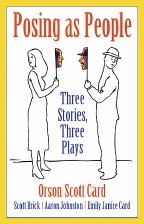 |
 Orson Scott Card / Scott Brick / Aaron Johnston / Emily Janice Card
Orson Scott Card / Scott Brick / Aaron Johnston / Emily Janice Card
Posing as People
Reviewed by: Stephanie Cage © 2007
Subterranean Press / Hatrack River
Publications
US Paperback
1 59606-015-8
Pages 208; Price $45
Date Reviewed: 29/6/05
Index:
Science Fiction General Fiction
A play on the page is not the same experience as a play on the stage. Stage directions, no matter how accurate and detailed, cannot bring a story to life in the same way as a three-dimensional performance. Reading a script, far more than reading a story, demands work on the part of the reader. In the absence of any descriptive writing, it becomes the reader’s job, and not the author’s, to animate the characters, and to endow them with appropriate appearances, voices, costumes and settings.
'Posing as People' unusually, helps the reader out. The book, a collection of three short plays by various authors and the Orson Scott Card short stories on which they are based, is accompanied by CDs of the live performances, adding another dimension to the reading experience. The plays were not designed as radio plays, and it’s a shame that they fail to convey strong visual elements such as the young and old Charlie in 'Clap Hands and Sing' and the limbless girl in 'Sepulchre of Songs'. Nonetheless, the audio recordings are sufficient to give a strong impression of the characters involved and the quality of the acting.
In Scott Brick's play 'Clap Hands and Sing', Stefan Rudnicki and the playwright himself bring Charlie, the aging inventor of a form of mental time-travel, and Jock, his attendant android, vividly to life. (Technically I suppose this is the wrong turn of phrase, since the android is mechanical, not living, but its strangely compassionate gestures seem to entitle it, in some sense, to the description). As his body fades, Charlie finds himself reliving the passions of his youth in a way that most elderly people can only dream about. The result is a touching evocation of the wisdom and regrets that come with age; a set of science-fiction variations on the theme set out by the title, which is taken from a poem by Yeats, to which both Charlie and Jock refer:
'An aged man is but a paltry thing, a tattered coat upon a stick, unless Soul clap its hands and sing, and louder sing, for every tatter in its mortal dress.'
The choice of 'Sailing to Byzantium' as a theme poem is apt: the future created in Orson Scott Card’s stories, and developed by the three authors in their short plays, is truly 'no country for old men'. In 'Clap Hands and Sing', Charlie has come closer than any other human being to mastering the mysteries of time, yet he is forced to confront his own mortality and question his ability to undo the mistakes of his past. In 'Lifeloop', the casualness of the conversation about Julia Roberts’ death (at the age of 82) highlights the casual assumption of immortality that has always been a failing of the very young. Yet ultimately Arran and Felice, the beautiful women whose ever-changing sexual conquests recall Yeats' 'young In one another’s arms', learn that despite the help of expensive drugs, they can only slow the march of time, not halt it, and that cruel words, once spoken, cannot be unsaid.
'Lifeloop', first published as a story in 1978, is proof of Orson Scott Card’s extraordinary prescience. In the original story, as much as in Aaron Johnson’s 2004 stage version, the spectre of Big Brother is never far away. A public hungry for simulated life tunes in to 24-hour reality television, and only gradually begins to ask questions about the toll it takes on the lives of those involved. Of the three stories, this is perhaps the one best suited to dramatic adaptation. It takes some courage for actors to ask an audience to believe in a drama about the nature of performance, but Card and his fellow writers/actors/directors do not shy away from big challenges, and in their hands the play takes on a wonderfully self-referential quality.
In the final play, 'A Sepulchre of Songs', Card’s daughter, Emily Janice Card, tackles the equally challenging task of building a play around a limbless, motionless figure. Elaine (movingly played by Emily herself) was crippled in an explosion as a child, and while her body is limited, her imagination has become boundless. 'A Sepulchre of Songs' blends some extraordinary flights of fancy with a down-to-earth relationship study: the therapist comes to love his patient but her extraordinary situation forces him to re-examine his approach to his work and learn that sometimes the human mind is its own best healer. We read in the Afterword that after writing the story, Card had a crippled child and experienced for real some of the challenges he'd invented for the therapist in his 1981 short story. Perhaps this in turn informed Emily's stage adaptation, in which the therapist's bizarre relationship with his teenaged charge comes to seem not only understandable but inevitable.
Each of the plays, although short, evokes a well-developed world, peopled with entirely believable characters. As an added bonus the essays that surround them (a foreword to the plays and an afterword to each of the stories by Orson Scott Card, as well as afterwords to the plays by their authors) go a long way towards explaining how the effect is achieved. While the CDs make for an enjoyable and thought-provoking evening's listening, the package as a whole has a great deal more to offer anyone with the time for further study. There is much here to learn about the differences between page and stage; the challenges of bringing any story — and especially a science fiction story — to the stage; and above all about the ways in which life and art so often mirror each other.
|
 |
